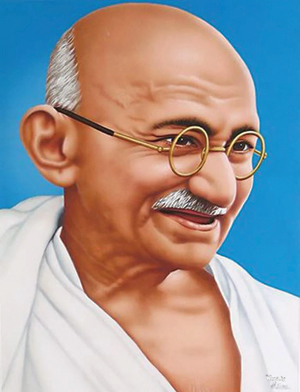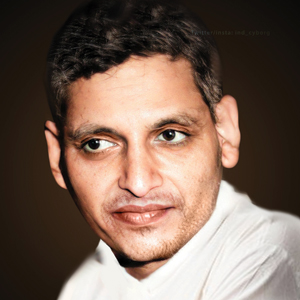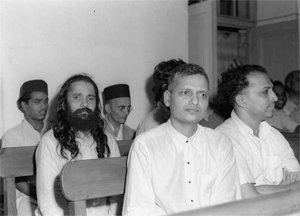No Justification of killing The ‘Father Of The Nation’ By Dr. Mohini Shinde
On January 30th, 1948, Hindu extremists Nathuram Godse assassinated Gandhi ji, the most well-known proponent of nonviolence in the world.
|
Editor’s note
It has been 75 years since we have lost our beloved Gandhi ji. On January 30th, 1948, Godse assassinated Gandhi ji, the most well-known proponent of nonviolence in the world. This tragedy serves as a reminder that the road to independence was not easy and that there will always be people who seek to sow conflict and division. Where there is extremist ideology, innocent people will always be killed.
Here is an article by Dr. Mohini Shinde, Hindu Scholar who was born and finished high school and college education from the same town as Nathuram Godse, who killed Gandhi ji.
Please read her views on Gandhi’s assassination.
Raj Shah
Managing Editor
 “I am a Hindu and I believe in rebirth. I pray to god that I am reborn with Gandhi so that I can kill him again.” Nathuram Godse, the man who, in a cruel twist of irony, brought about a violent end to the most prominent advocate of nonviolence in the world, said as much. He said this calmly, like a man who fully believed in his ideas and was assured of his conduct, rather than with a raging passion that clouded his judgment. Nathuram Godse was a violent, murderous, and fanatical religious fanatic. a man who invoked passages from the Bhagavad Gita to defend his behavior. A man who undermined all India and Hinduism stood for, including tolerance, democracy, and secularism. Certainly, let’s construct a temple for him!
“I am a Hindu and I believe in rebirth. I pray to god that I am reborn with Gandhi so that I can kill him again.” Nathuram Godse, the man who, in a cruel twist of irony, brought about a violent end to the most prominent advocate of nonviolence in the world, said as much. He said this calmly, like a man who fully believed in his ideas and was assured of his conduct, rather than with a raging passion that clouded his judgment. Nathuram Godse was a violent, murderous, and fanatical religious fanatic. a man who invoked passages from the Bhagavad Gita to defend his behavior. A man who undermined all India and Hinduism stood for, including tolerance, democracy, and secularism. Certainly, let’s construct a temple for him!
Religious fanaticism in our day and age is a danger to world peace. We support the idea of religious acceptance. We issue strongly worded declarations denouncing the Taliban and ISIS. We have read carefully written essays warning against combining politics and religion. We are thoughtful, contemporary people who prefer to imagine secularism as an ethereal good circling above our heads.
But repressed demons have emerged from our murky underbelly and entered primary school textbooks, public statements, and parliamentary debates. The webs of restraint that had held it all together are being broken by wheels that have been set in action and are silently whirling. State legitimacy is being conferred on voices that require opposition. Due to the allure of the future, we are currently being forced backwards.
Mahatma Gandhi was a symbol as well as a human being. He spread the value of nonviolence throughout the world. He forced the colonial powers to submit via shame. He had faith in humanity and the idea of a tolerant people bound together by the concept of India.
He had faith in something more profound than religion. Sadly, once the British Empire faded into history, politics underwent a dramatic change in nature that made it difficult to tame. In his later years, Gandhi was a lonesome man, engaged in a solitary conflict, and battling for a philosophy.
 India hadn’t yet accepted its own identity. The wall of solidarity that had expelled our oppressors has developed communal fissures. Hindu radicals viewed Gandhi as a traitor to Hindus, who were ‘his people’ by accident of birth. Instead of giants, there were groups of irate minions fighting. Gandhi was trampled by the ants at his feet because he held fast to a higher ideal.
India hadn’t yet accepted its own identity. The wall of solidarity that had expelled our oppressors has developed communal fissures. Hindu radicals viewed Gandhi as a traitor to Hindus, who were ‘his people’ by accident of birth. Instead of giants, there were groups of irate minions fighting. Gandhi was trampled by the ants at his feet because he held fast to a higher ideal.
Famously, Godse emphasized his admiration for Gandhi’s integrity. He was a failed politician, he said, but “I used to admire him as a saint because he always told the truth, which was not easy.” He was at conflict with Gandhi’s philosophy. And shooting him over it was acceptable. Godse rationalized murder by giving it a reason and a lofty objective. Godse committed terrorism.
He felt alone and distant immediately after the murder. He had been a member of the RSS and the Hindu Mahasabha, both of which he had derived inspiration from, and both of which went to great measures to distance themselves from possibly the most despised man in the nation at the time. Later, Gopal Godse, his own brother, confirmed to the fact that Savarkar and the RSS were not entirely blameless for the conspiracy.
Nathuram Godse never quit the RSS, he revealed. A Hindu Mahasabha member named Digambar Badge testified against Savarkar, whose approval, he claimed, allowed the Mahatma to be killed.
Today marks 67 years since the murder of our country’s founding father in broad daylight. Faces are coming out of the shadows, and in a nation governed by positive forces, they now have the audacity to finally reveal who they really are. Faces are coming out of the shadows, and in a nation governed by positive forces, they now have the audacity to finally reveal who they really are.
Hindu radicals from all over the nation have been celebrating November 15 as “Maryrdom Day” since Godse’s hanging on that day. In Maharashtra, plays that praise Godse’s crime play to full audiences. Everything has now come to light in the open.
 The Hindu Mahasabha is preparing to step up its operations by bringing Godse’s philosophy of religious hatred to Hindu temples across the nation after the Uttar Pradesh state police foiled their attempts to construct statues of Godse at many designated locations. “We have a committed group of young people who are filled with nationalistic zeal and who are willing to risk being arrested to erect Godse’s statue at the Raj Ghat, but we don’t want to operate that way. A leader of the Hindu Mahasabha stated, “We simply want to promote the concept of ‘Akhand bharat’ (united India), which was Nathuram Godse ji’s primary goal.
The Hindu Mahasabha is preparing to step up its operations by bringing Godse’s philosophy of religious hatred to Hindu temples across the nation after the Uttar Pradesh state police foiled their attempts to construct statues of Godse at many designated locations. “We have a committed group of young people who are filled with nationalistic zeal and who are willing to risk being arrested to erect Godse’s statue at the Raj Ghat, but we don’t want to operate that way. A leader of the Hindu Mahasabha stated, “We simply want to promote the concept of ‘Akhand bharat’ (united India), which was Nathuram Godse ji’s primary goal.
What message are we conveying when we elevate a terrorist? When so many of our nation’s great leaders have statues in their honor at the very least, why should a temple be constructed for Godse, a murderer? Will the murderer of Gandhi’s words soon be found in the literature that our children read in school? Will his radical program get more supporters and emerge?
What distinguishes one terrorist act from another? If Godse had been a Muslim, would he have been hailed as a martyr? We must comprehend that terrorism is not a religious issue. Whatever the motivation, murder is never justified, and this is something we must all realize.
The way to do it is definitely not by constructing temples. How deep will we go before the darkness engulfs us and suffocates us?
About the Author
Dr. Mohini Shinde is a professor of religions of India and has taught Hindu religion and world religion in several US universities before her retirement. Her research was on religion and politics in South Asia. In her research engagements, she lived several years in India where she studied vedas and upanishads. She lives in California with her husband.































